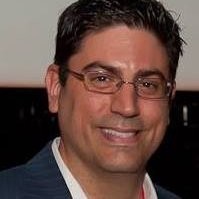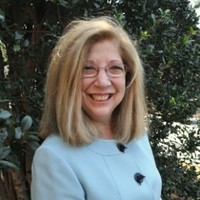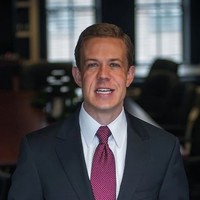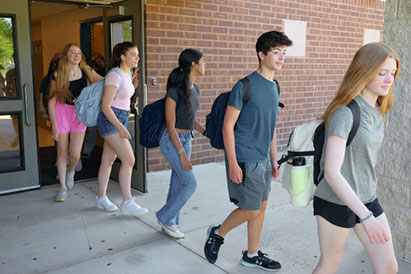This interview was conducted by the Philanthropy Roundtable in conjunction with the CivxNow Policy Summit. See more interviews and case studies about how philanthropy is engaging in civic education here.
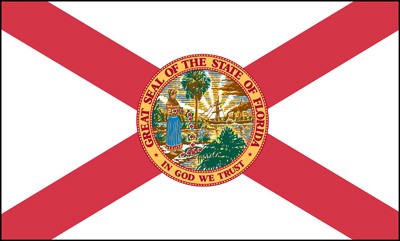 Right now in Florida, three major civic education organizations, the Bill of Rights Institute (BRI), the Jack Miller Center (JMC), and the Ashbrook Center have pooled their resources in an attempt to provide professional development for civics and history teachers in one of the country’s largest states.
Right now in Florida, three major civic education organizations, the Bill of Rights Institute (BRI), the Jack Miller Center (JMC), and the Ashbrook Center have pooled their resources in an attempt to provide professional development for civics and history teachers in one of the country’s largest states.
The American Civics and History Initiative (ACHI), is an ambitious initiative to train more than 6,800 teachers in the Sunshine State — reaching more than 680,000 students — over the next two years though five-day institutes, seminars, and webinars designed to empower educators with rich, content-based programs and resources they can use in the classroom.
ACHI would not be possible, however, without the involvement of the Jack Miller Family Foundation, which is funded by Florida-based philanthropist Jack Miller. It was Miller that brought together BRI, JMC, and Ashbrook, and now is facilitating ACHI not just by writing checks, but by acting as a partner in the initiative, along with the Marcus Foundation, funded by philanthropist Bernie Marcus, who is also based in Florida.
The unique collaboration between organizations and foundations provides an interesting case study that others can follow — especially as these groups look to scale what they have started in Florida and potentially bring ACHI to other states across the country.
Below, you’ll read two interviews that discuss how ACHI came about its goals, and how the collaborative effort works logistically. The first is with Jonathan Greenberg, the Director of Freedom Initiatives at the Jack Miller Family Foundation, and Elisa Levy, Program Director at The Marcus Foundation. The second is with BRI President David Bobb and Ashbrook Executive Director Jeff Sikkenga.
Together, we hope the interviews provide insight from both the funder and the grantee perspective.
PART I — INTERVIEW WITH THE FUNDERS
Jonathan, can you tell us what are the foundation’s goals for the American Civics and History Initiative?
Jonathan Greenberg (Jack Miller Foundation): The goal is for every civics, history, economics teacher in Florida, in middle and high school, to have improved access to the documents of America’s founding and the historical record of America’s founding; to have a content-based education that they can fall back on, that they can use in teaching their kids and that they can then easily take and translate into what they do in the classroom.
The truth is that most teachers don’t get a lot of content. I think we’ve all talked about this at one point or another, that you can get out of school really knowing very little about the topic you’re taught. Well, we believe that the best teaching comes from deep learning, especially if you’re teaching America’s founding, especially in a topic like civics. In math, there are right and wrong answers, in science, there are right and wrong answers. It’s possible to just teach out of a book in civics, but it’s a lot harder. If you’re going to lead a conversation in your class, you have to really have significant roots in the topic that you’re teaching. And most teachers, through no fault of their own, don’t. Florida’s looking at changing that on a policy level, but we think that providing this information is the key to getting kids better prepared for the responsibilities and duties of citizenship. And so that is what we were hoping to accomplish. There are a little over ten thousand civics teachers in middle and high school in Florida. Our goal is to get every single one of them to take some of these professional development courses and be better prepared to teach kids.
That is not a small goal, it’s a big goal. You have made very clear that this takes collaboration, and it takes multiple people working together. Talk a little bit about the collaboration that you helped bring about for the ACHI.
Jonathan Greenberg (Jack Miller Foundation): Almost two years ago, Jack called together a group of 30–35 different organizations at our offices in the suburbs of Chicago. We put to them a simple question: What do we do? What can we do to turn the tide? This was before last summer’s protests and pulling down statues. But those of us who’ve been working in Civic Ed have known for some time that there was a brewing crisis. The wave crashed over America last summer. Jack put this group of people together, everybody showed up in the suburbs of Chicago, we had a long conversation about it…. What came out was that we needed to cooperate with one another.
Even organizations that shared similar missions and similar tactics were operating in silos and not working together. And I think probably all of our donors have complained about this at one point or another. And, it bothers Jack Miller, the chairman of the board of the Jack Miller Center. We had to go out and convince the Bill of Rights Institute and Ashbrook to work together on a project, on a handshake agreement that involved fundraising. We had to stitch that alliance together.
Why did you choose Florida as the place to focus first?
Jonathan Greenberg (Jack Miller Foundation): There are several reasons, the easiest of which is that Jack is a Florida resident. But there are a lot of structural and political reasons and demographic reasons why Florida made sense. So I don’t know if Florida is a purple state, but there are significant blue pockets in the state. It’s a large state. It’s an incredibly diverse state. And one of the things that Jack has always said he values is that every American kid, regardless of geography or demography, should be well grounded in America’s founding principles and history. And so working in Florida allows us to do this.
The Panhandle is very ethnically and culturally different than Miami Dade and Orange County. It has its school districts organized at the county level. So you’ve got some very large school districts and you have some very small school districts, and everywhere in between. It makes sense that way. And we also have a political climate in Florida where the sitting governor actually ran on civics. I’m not sure any other governor in America did that. But DeSantis actually talked about improving civics in Florida when he ran for governor. So you can say he has a mandate from voters to do it.
A lot of times grantmakers write the check and that’s it. What are the kinds of things that you have done beyond writing the check? How did you work closely with the grantees in a way that didn’t spook them?
Jonathan Greenberg (Jack Miller Foundation): One of the ways that we facilitate collaboration between the organizations is that we have a weekly Zoom call every Tuesday morning, that I effectively chair. The heads of the organizations and development directors of the organizations call in, along with a couple other key staff people, and so we’ve got the Jack Miller Center, Bill of Rights Institute and Ashbrook on a call with each other every week. We have organizations tell me what the agenda items are. And I go over those agenda items and every once in a while I’ll add something. But really, it’s their agenda of sharing. And what we found is that doing it this way actually makes the collaboration easier because none of the three organizations are leading. So it doesn’t have to be the Bill of Rights Institute and Ashbrook following the Jack Miller Center. It’s all three organizations working together. And I just chaired the meeting. I’m a not-so-disinterested fourth party. And so organizationally, we find that that works really, really well. It’s a further investment on Jack’s part, because obviously it involves some of my time.
The leaders of BRI, Ashbrook and the Jack Miller Center get together on these Zoom calls. And the first thing they’re thinking about isn’t me, me, me. It’s collaboration and working together and honoring agreements and making agreements by handshake — covid virtual handshake. And it’s been really exciting to watch these people who are so mission driven that they’re willing to come out of their silos and do this work together.
So what have been the major outcomes, Jonathan? Why is this working?
Jonathan Greenberg (Jack Miller Foundation): It’s hard to measure how something like this works because really the rubber hits the road when the teacher takes the information back to the classroom, teaches the kids. So it’s the actual effect we’re going to see later. What we can judge is how many teachers we’re reaching. So at the beginning of this exercise, all three organizations had already dealt with, taught, or had other professional development events with about 5,000 of the roughly 10,000 teachers in Florida. So about half of the civic teachers in Florida were already familiar with the Bill of Rights Institute, Ashbrook and Jack Miller Center. We only were able to have in-person events, which were organized by the Department of Education with the help of the Marcus Foundation. Before that, everything was virtual, 90 minute sessions and things like that.
But we’ve actually taught more than a thousand new teachers in Florida. Our goal at the beginning of this was another 2,500. But even with the restrictions that covid put on the three organizations, they were still able to bump that number up by over a thousand teachers.
So now, Elisa, the Marcus Foundation joins this effort at a certain point. When did that happen? And why did that happen?
Elisa Levy (The Marcus Foundation): We joined a year ago at the time of the ACHI launch. The key is the opportunity to both provide professional development to the teachers based on the core documents of American History and to intersect with an existing grantee, the Florida Civics and Debate Initiative where professional development opportunities can be leveraged. Both Bernie and Jack are philosophically aligned that every child needs to be educated based on the democratic principles of society. Our goal is make sure that children spanning K-12 have the opportunity to build a strong foundation upon which to make educated, informed decisions as community citizens
Why was it the right opportunity for your team? Yes, there’s a Florida connection and there’s an interest in Florida. There’s philosophical alignment. What was it about the project itself that made it the right investment?
Elisa Levy (The Marcus Foundation): We have learned a lot about all three organizations that are collaborating as ACHI and had already invested in the Bill of Rights Institute. This was an opportunity to scale throughout Florida and evaluate what a collaborative effort could accomplish. The ideal would be to have this nationally. The weekly meetings provide equal opportunities for sharing and implementing marketing, communication, training and other programmatic objectives.Through collaboration and the sharing of teacher lists, marketing and having one website for all three organizations, more teachers have been reached than would be reached through individual efforts and ultimately, more students are being reached.
So the collaboration seems to be the big focus here — the difference maker — for you and your foundation.
Elisa Levy (The Marcus Foundation): I also think it’s the opportunity to leverage that collaboration with existing grants like the Florida Civics and Debate Initiative. Recently, I had the opportunity to actually see 240 teachers on the ground at a professional development day where all 240 teachers got to rotate from room to room to room to understand how the core documents, such as the Declaration of Independence, the Bill of Rights, the Constitution and the Gettysburg Address and used as resources to teach critical thinking, citizenship, understanding how our government works and more. The teachers got to observe and participate with different teaching methods, for example, the Socratic method, a lecture method or through role playing and simulations. Imagine a consumer fair on civic education with different teaching styles, a variety of core documents and resources devoted to American History and Civics all with the same fact-based, conservative based philosophy. This was the introduction, a lighter version, where all teachers had an opportunity to taste different varieties and yet learn based on common democratic principles. When we refer to professional development opportunities, typically, we refer to American history and social studies teachers, but this teacher professional development workshop included debate coaches, drama coaches, and English literature teachers. So to me, that, again, is leveraging reach beyond the traditional American history teacher and reaching more teachers and reaching more students.
That is very cool. I think that’s a very innovative and different way of doing a program than what I’ve heard or seen before. Do you think this can be replicated in other places, especially because BRI, Ashbrook and Jack Miller Center all have a national presence?
Elisa Levy (The Marcus Foundation): Absolutely! I think that if the three organizations want to continue to work together and if additional funding is awarded, this effort can be transformational and national in its impact. And I think for the Department of Education and the State Department of Education to provide these development opportunities, for them, it was sort of like the light bulb went off in their head when they saw everybody partnering together, when they saw the collegiality. When they got to move from room to room and see the information presented and the teachers engaged, they recognized that it was a no-brainer. So if other State Departments of Education are receptive and they have to do this anyway, why could it not be replicated? I mean, I just think it’s a no-brainer. Absolutely. And the teachers want it.
So, Jonathan, I would love to hear what you are thinking about the next steps for the program and what is it going to take to actually replicate this?
Jonathan Greenberg (Jack Miller Foundation): So we’ve already had conversations with a number of different governors. The idea is to find states that will give us a thumbs up in terms of the state board of education, the commissioner of education, whatever setup they have. And frankly, where the governor is going to help us identify — and introduce us to — the people who are the big education donors in the state. They can tell you every conversation that we’ve had, governors and their staff, people love it when they find out that we’re not asking for state funding. The idea is to fund all of this privately and to do quite a bit of it in state.
So, for the most part, we’ve raised Florida dollars to pay for Florida teacher education. That may be a little harder in places like Nebraska and some other places. And I don’t think we’re ideologically committed that every dollar has to be from that state. Quite the opposite, actually. But I do think that there’s something to going to the major foundations in each state and saying that, if education is something that matters to you, you’re one of the biggest donors in the state, and this is going to impact your state this way….
I think we’ve mentioned Tennessee and Nebraska. We also had a conversation with Governor Hogan from Maryland not long ago. I think it’s like I said at the beginning of this, it’s been very important to Jack that this is across demographics. And so that includes red and blue.
We don’t just want this to be a project for red states. In fact, if we’re going to have one country that coheres as a single country, it can’t just be red states. So the idea is to make sure that blue state governors are involved. We’ve got a couple of states that are red states with Democratic governors, Kentucky and Kansas come to mind. So, you know, eventually we’ll reach out there. But effectively, we’re trying to go where to start off with low hanging fruit. So Tennessee, Nebraska, these are places where Jack has forged good relationships in the governors offices. In Texas, we have good friends with the Texas Public Policy Foundation. And we think that Texas is also a place that is ripe for this kind of investment and on and on. And I would like at some point to bring in other organizations.
PART II — INTERVIEW WITH THE GRANTEES
David, could just give a little bit of a history of how the American History Civics Initiative (ACHI) came to be. Did you approach Jack Miller or did Jack Miller approach you, what was the genesis?
David Bobb (Bill of Rights Institute): Well, it’s been a true collaboration in every sense of that word. I work at an organization called the Bill of Rights Institute (BRI). We’ve been doing this for a little over two decades. We’ve been rowing in the same direction as the Ashbrook Center and now the Jack Miller Center for that length of time, and of course, had various knowledge shares. Our paths would cross. There’d be different points of intersection. But when Jack Miller pulled together a forum with Jonathan Greenberg and some other funders, Jeff and I found ourselves front and center in a conversation with Jack and a whole room full of people. And it was out of that conversation, really, that grew this idea. Why don’t we really formalize things? Why don’t we throw in together and make this more intentional? It really did help to have funders leading the way, but it was a natural programmatic fit and it’s been a really fruitful partnership since that day.
Jeff, you were in the same boat and went to the same meeting. What were your thoughts about this, coming from Ashbrook?
Jeff Sikkenga (Ashbrook): As David said, it was collaborative from the very beginning. It was a Constitution Day program that Jack put together, and David and I were speaking on the same panel. We were up in front and realized, based on the conversation that we were having with each other and with the other folks in the room, that there really was an amazing natural fit. As David said, Ashbrook has been doing this for several decades as well. Of course, we know the Bill of Rights Institute. Our paths crossed many times, and we’ve had conversations. But I’m not sure if we’d ever been in the same room talking about the same kind of programs for teachers around the country. It was really a coming together in that moment. And then the conversations with Jack right at that time and then shortly after that really started the ball rolling.
And when you came back to your organization, Jeff, what was the feedback from your staff and your board about this initiative?
Jeff Sikkenga (Ashbrook): Very positive. It was one of those situations that I’m sure entrepreneurs find themselves in, when people ask, “surely that’s been done, right?” And then they say, “Oh, it hasn’t been done…. Wow, market opportunity here.” It was really like that. It was Jack bringing us together in that room for that conversation that really showed us the opportunity.
What is the dynamic like working with the Bill of Rights Institute and the Jack Miller Center? How did you guys move forward together with this initiative? Did you have a plan? What are your communications like?
David Bobb (BRI): The enthusiasm was there from the get-go from the Bill of Rights Institute team. I think that when you’re rowing in the same direction, you have the opportunity to really see a force multiplier and really be intentional about knowledge sharing and the ways in which we can reach teachers. Bringing in the Jack Miller Center was also, I think, a natural fit. A number of years ago, when Tom Kelly was coordinating that effort for Jack, the center ventured into civics. As our nation looks at turning 250 years old, we have a big question in front of us. And I think all three organizations are on the same page and saying that to get the answers for the next 250 years and to chart our course, we have to look to the Declaration and the Constitution. We have to look to those founding principles. And that was the natural fit.
So the conversation is flowing from that and flowing from the idea: Hey, let’s put some real substance to this. Let’s have a memorandum of understanding.
There were lots of conversations, meetings, brainstorms, all of the good things that happen in an entrepreneurial environment. And out of that came a really clear strategic plan. I was really amazed at how really seamlessly and quickly we moved into that. And we’re able to say, “Here’s how we can each execute on our own mission. But what we’re going to get out of this effort is going to be greater than just adding up the individual parts.”
And what was the dynamic like with the funders? How was the dynamic between the funders and the grantees?
Jeff Sikkenga (Ashbrook): Well, that’s a great question, because I think when we had approached funders before collaboratively, the response was again, “How come more people aren’t doing this already? This is a great idea.”
Funders are always looking to maximize the return on their investment, and rightly so. And they realize that when you get a collaboration, that’s more than just the sum of the parts. It’s a force multiplier, and that’s a better return on investment. And so there’s no question that funders are excited in and of itself for this collaboration and what we can do together, but also as a model for other groups and other organizations who all are rowing in the same direction.
Ashbrook and BRI were both running initiatives in Florida before ACHI came into play, and in other states as well. Why was Florida the best state to do the test pilot of this initiative?
David Bobb (BRI): There’s a lot of ground to cover in a nation of 330 million people. One of the things that we looked for was really what is a state big enough to be a large challenge for us, but one that is emblematic of some of the division that exists around our country. When you teach civics and history, you realize very quickly that this is an extremely polarized topic. And yet all three organizations are dedicated to common reference points and anchors. Think of teaching the primary source documents, teaching the principles of the Declaration and the Constitution. So being on the same page allowed us to say, OK, where is it that we have a pretty good sized footprint between the two organizations that bring the most experience to bear? And how could we create an atmosphere in which the Jack Miller Center’s work would be best received? And so we did some baseline work. We were already reaching a pretty good number of the teachers in the state of Florida, such that we could, after two years, potentially be reaching a full majority of the secondary school teachers of American history and civics. That was our goal from the outset. We chose Florida as a pilot state because it is emblematic of the kind of challenge that we can tackle thereafter.
Jeff Sikkenga (Ashbrook): I would add that Florida is an amazingly diverse state: rural, urban, suburban, north, south, east, west, and a growing student population. The diversity of geography, of demography, of regions really made it ‘if you can do it in Florida, you can do it anywhere.’
Would you also say that the government of Florida helps, having a friendlier governor who might have been more interested in this idea, and maybe a more supportive State Department of Education?
David Bobb (BRI): We definitely factored that in and want to continue to do so as we evaluate which next states are going to fit the strategic priorities of the American Civics and History Initiative. We have been pleased to see that the state’s climate, both from previous administrations and the current one, has created an environment that sets up a lot of these incentives in a pretty good direction. That’s not true of all states. And it’s not like it’s a blue versus red thing either. There’s a lot going on when the government gets involved in education. And one of the things I think that really knit us together is that we believe in a kind of groundswell effort. We’re not insistent, nor do we depend on, bureaucratic openings for our work. We’re really going directly to the educators. And that’s a common part of our business model. And I think that’s why, regardless of the political climate, we want to be in every place where we can make a difference. And Florida has proven to be a state in which we have found good partnership opportunities. But it’s not the only reason we’re in the state.
Jeff Sikkenga (Ashbrook): The initiative really is a grassroots initiative, and we will start in Florida. Then if everything works well, we expect and plan to expand, but that’ll be from the ground level up, not from the top down. I think it’s fair to say that too much change has been attempted from the top down in civics and history, and often it just doesn’t work. It just ends up being another series of unfunded mandates on teachers and students and classrooms and schools. We much prefer to partner directly with the teachers in the school districts, and build up.
In your strategy, as you think about expanding into other states, do you have an idea or kind of a path forward in that?
David Bobb (BRI): One of the exciting things about working with Jack Miller and the Marcus Foundation, and the Impact Fund, is that if Jack Miller had his way, we’d be in the other 49 states and DC tomorrow. We love that incredible enthusiasm that he’s brought to this project. He’s an amazing partner, an amazing catalyst. That being said, Jack and our other partners and the three organizations really know that for us to grow this in the way that is going to be built for the long term, we really want to take time to evaluate and be able to learn from our experience in Florida. So we’re right now setting up a kind of decision making framework for saying what’s next on the horizon. Let’s pick maybe a handful of states, identify them, prioritize them, but in so doing, really establish these are the criteria that are going to serve us well.
